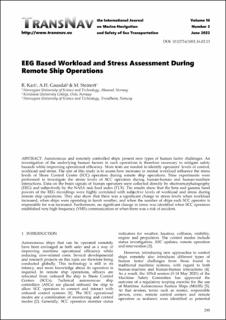| dc.contributor.author | Kari, Raheleh | |
| dc.contributor.author | Gausdal, Anne Haugen | |
| dc.contributor.author | Steinert, Ralf Martin | |
| dc.date.accessioned | 2023-01-20T08:42:27Z | |
| dc.date.available | 2023-01-20T08:42:27Z | |
| dc.date.created | 2022-08-09T17:45:24Z | |
| dc.date.issued | 2022 | |
| dc.identifier.citation | TransNav, International Journal on Marine Navigation and Safety of Sea Transportation. 2022, 16 (2), 295-305. | en_US |
| dc.identifier.issn | 2083-6473 | |
| dc.identifier.uri | https://hdl.handle.net/11250/3044816 | |
| dc.description.abstract | Autonomous and remotely controlled ships present new types of human factor challenges. An investigation of the underlying human factors in such operations is therefore necessary to mitigate safety hazards while improving operational efficiency. More tests are needed to identify operators’ levels of control, workload and stress. The aim of this study is to assess how increases in mental workload influence the stress levels of Shore Control Centre (SCC) operators during remote ship operations. Nine experiments were performed to investigate the stress levels of SCC operators during human-human and human-machine interactions. Data on the brain signals of human operators were collected directly by electroencephalography (EEG) and subjectively by the NASA task load index (TLX). The results show that the beta and gamma band powers of the EEG recordings were highly correlated with subjective levels of workload and stress during remote ship operations. They also show that there was a significant change in stress levels when workload increased, when ships were operating in harsh weather, and when the number of ships each SCC operator is responsible for was increased. Furthermore, no significant change in stress was identified when SCC operators established very high frequency (VHF) communication or when there was a risk of accident. | en_US |
| dc.language.iso | eng | en_US |
| dc.publisher | TransNav | en_US |
| dc.relation.uri | https://www.transnav.eu/Journal_Vol._16_No._2-June_2022,62.html | |
| dc.rights | Navngivelse-Ikkekommersiell 4.0 Internasjonal | * |
| dc.rights.uri | http://creativecommons.org/licenses/by-nc/4.0/deed.no | * |
| dc.title | EEG Based Workload and Stress Assessment During Remote Ship Operations | en_US |
| dc.title.alternative | EEG Based Workload and Stress Assessment During Remote Ship Operations | en_US |
| dc.type | Peer reviewed | en_US |
| dc.type | Journal article | en_US |
| dc.description.version | publishedVersion | en_US |
| dc.source.pagenumber | 295-305 | en_US |
| dc.source.volume | 16 | en_US |
| dc.source.journal | TransNav, International Journal on Marine Navigation and Safety of Sea Transportation | en_US |
| dc.source.issue | 2 | en_US |
| dc.identifier.doi | 10.12716/1001.16.02.13 | |
| dc.identifier.cristin | 2042062 | |
| cristin.ispublished | true | |
| cristin.fulltext | original | |
| cristin.qualitycode | 1 | |

